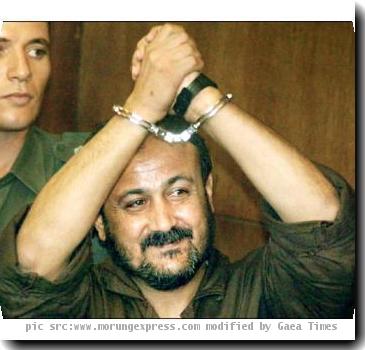Israeli PM, top ministers hold intense discussions ahead of possible prisoner trade
By Aron Heller, APMonday, December 21, 2009
Israel close to deciding on prisoner swap
JERUSALEM — Israeli Prime Minister Benjamin Netanyahu and his top ministers on Monday debated whether to approve an emotionally charged deal to trade 1,000 Palestinian prisoners for an Israeli soldier held by Gaza militants for more than three years.
Netanyahu and six ministers had met three times on Sunday, and again on Monday morning. Army Radio reported that an afternoon gathering was planned. With the group divided over the proposed deal, Netanyahu could well bring the final decision to a vote in his full Cabinet.
At a protest tent outside the prime minister’s official residence, dozens of demonstrators carried cardboard cutouts of the captured soldier, 23-year-old Sgt. Gilad Schalit, and urged Cabinet ministers to wrap up an agreement.
A deal, if approved, could dramatically improve the standing of the Gaza Strip’s Islamic militant Hamas rulers among Palestinians and herald an easing of the blockaded territory’s crippling isolation. The chief loser could be Hamas’ bitter rival, Palestinian President Mahmoud Abbas, who is backed by the West but whose popularity has suffered at home.
Bringing Schalit home could boost Netanyahu domestically given the Israeli public’s deep concern for the young man’s fate. However, it could also hurt the prime minister’s standing among Israelis who feel releasing prisoners convicted of violence would only invite more bloodshed.
The swap, if approved, would be subject to a 48-hour period for opponents to file legal challenges.
Hamas spokesmen had no comment on the dealmaking Monday.
Israel and the Iranian-backed Hamas have held multiple rounds of swap talks, most mediated by Egypt, ever since militants affiliated with the Islamic group dragged a bleeding Schalit into Gaza following a cross-border raid in June 2006 that also killed two other soldiers. Momentum picked up in recent months with the introduction of a German mediator into the negotiations.
Israel has been reluctant to meet Hamas’ demand to release dozens of Palestinians involved in deadly attacks on Israelis — including some of the most notorious suicide bombings of recent years. It also wants some of the prisoners deported outside the West Bank, for fear they would resume their violence against Israel, as did some Palestinians freed in previous releases.
Schalit’s parents sat down with Netanyahu after the ministers’ morning meeting. There was no immediate word on the substance of their discussion.
“I hope that they will decide today and that everyone who votes understands that their vote means either a death sentence for Gilad or that he will be set free,” Aviva Schalit told Army Radio before meeting Netanyahu.
Prisoner swaps are controversial in Israel because of their potential to encourage militants to take more hostages. But the plight of the quiet, gangly tank crewman has touched the hearts of many Israelis, where military service is compulsory and most families have relatives who serve.
For the Palestinians, the release of hundreds of men, women and teen-agers would be a major victory. Most Palestinian families have had relatives in Israeli jails at one time or another, and the prisoners have come to achieve near-iconic status in Palestinian society.
Aside from handing Hamas new political capital, a release could lead to the easing of a blockade that Israel and Egypt have imposed on Gaza since Hamas wrested control there in 2007. Schalit’s captivity is one of the reasons Israel maintains the embargo. The blockade has prevented Gazans from rebuilding after Israel’s punishing offensive there a year ago.
Hamas released a video of Schalit in October — the first time he had been seen since his capture. Hamas also declared last month that all of Gaza’s militant groups had agreed to suspend rocket attacks on Israel.
Sporadic attacks have occurred since then, eliciting retaliatory Israeli strikes.
A Palestinian familiar with the talks has said the prisoners would be released in two stages. A first group of 450 would be freed as Schalit is handed over to the Egyptians, and then returned to Israel.
The remainder would be released weeks or even months later.
Hamas has been demanding that the list of freed prisoners include Marwan Barghouti, a popular leader of Abbas’ Fatah Party, who favors a peace agreement with Israel but is serving five consecutive life terms for his role in shooting attacks that killed four Israelis and a Greek monk.
His release could force the 74-year-old Abbas aside because Barghouti has remained widely popular with the Palestinians even while behind bars and has aspirations to become president.
Tags: Blockades, Gaza Strip, Israel, Jerusalem, Middle East, Palestinian Territories, Territorial Disputes
